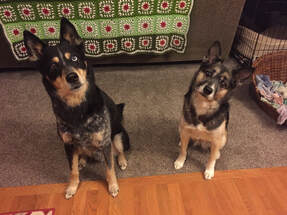
We heard that a lot of you may have added puppies to the family this Christmas. In order to help you guys get off on the right foot (and make sure your Christmas puppy becomes a forever dog), I wanted to offer some basic advice to help with some basic puppy behaviors. So, let's start with potty training--one of the number one things people ask about on online forums and groups when it comes to new puppies. And, if you added an older dog that is struggling with potty training, these tips will work, too!
First, remember that puppy bladders are not fully developed, and the muscles they use to control whether they go or not are also not fully developed (much like babies can't control when/where they go). So, it is our job to be proactive and make sure we can prevent accidents AND teach our new puppy the desired place to go.
First, if you are using puppy pads, I suggest you stop. Reason being that they can confuse your puppy because sometimes they are allowed to go indoors and sometimes they aren't. Yes, I know they are convenient, but it could mean a longer potty training process.
Next, make sure you take your puppy out often. Every 30-60 minutes is ideal at first, but definitely after eating, drinking, playing and sleeping. Take your puppy out on a leash (even if you have a fenced in yard) and keep them moving. Give them a chance to sniff and pick a spot (some dogs, like Gracie, are SUPER picky about where they go. Other dogs, like Garmin, just stop in mid run and go). When your puppy goes, praise them and, if possible, give them a treat immediately after they go to reinforce that they did what you wanted them to do. Reinforcing in the moment is very important as puppies and dogs don't necessarily understand "after the fact" reinforcements (or punishments, for that matter).
When you take your puppy back indoors, do not let him out of your sight until you are 100% confident that they understand that outside=potty. I advise using baby gates to create a space for you and your puppy or something like an ex-pen to create a safe space for your puppy to hang out where you can watch him. If neither of these is an option, using a leash to tether him to you will work, but it is more restricting to the both of you. By keeping your puppy in sight, you can look for signs of needing to potty (sniffing, circling, whining, etc.).
In the event your puppy has an accident in the house, do NOT scold, yell, smack, or force your puppy to "look at what he's done." This will not help your potty training process and it could actually create a dog that is afraid to go to the bathroom in front of you at all, which will also complicate your process. Instead, clean up the mess with an enzymatic cleaner and move on and think about what happened that led the puppy to having the opportunity to go potty in the house. Did you wait too long to let him out? Was he out of your sight? Did he not fully go when he was out just a few minutes ago? Whatever it was, remember that your puppy isn't doing it to make you angry or out of spite--he is just a baby and he can't hold it.
Overnight you may need to set an alarm and get up a few times at first to let him out. Yes, this means interrupted sleep, but it can also prevent you from waking up to a puppy who has pottied in his crate overnight. If you work full time, see if you can get someone to come let the puppy out once or twice during the day at the beginning (you won't have to do this forever).
Puppies don't gain control of their bladders really until they are somewhere around 6 months old, so be patient. Understand that accidents happen, work hard to set you and your puppy up for success and enjoy a long and happy life together.
Stay tuned for other new puppy tips in this Train Your Dog month. And feel free to share with anyone who has a new puppy adding joy to their household. Happy Training and Happy Dogs!
 RSS Feed
RSS Feed
